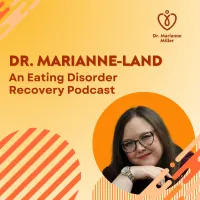Episode Description
What happens when an eating disorder has been part of your life for years or even decades. In this solo episode, Dr. Marianne Miller explores what recovery can look like when anorexia or bulimia becomes chronic, persistent, or long-term. Drawing from her experience as a therapist specializing in eating disorders, Dr. Marianne offers trauma-informed, neurodivergent-affirming, and body-liberation tools that help people reconnect with their bodies, support their nervous systems, and rebuild trust when recovery feels unreachable.
This episode provides compassionate guidance for anyone who has lived with an eating disorder for a long time and wonders if healing is still possible. It also supports clinicians, loved ones, and helpers who want to understand the realities of severe and enduring eating disorders with more depth, nuance, and humanity.
Why This Episode MattersPeople with chronic anorexia or bulimia often feel overlooked by treatment models that expect rapid transformation or complete symptom remission. Many have cycled through recovery attempts and relapse, often carrying shame for not recovering quickly enough. Dr. Marianne reframes chronic eating disorders as endurance rather than failure. She introduces recovery approaches that honor the nervous system, acknowledge survival strategies, and center autonomy, safety, and dignity.
Key Topics CoveredThis episode explores why chronic anorexia and bulimia develop and why they persist over time. It highlights how survival strategies become deeply wired into the nervous system and how shame, trauma, sensory overload, and systemic oppression shape long-term eating disorders. Listeners learn how to use persistence instead of perfection, how to rebuild interoceptive awareness, how to support sensory needs, and how to regulate the nervous system in ways that feel gentle and sustainable. The episode also introduces self-compassion as a powerful tool that helps soften shame and create the conditions for real healing. Dr. Marianne explains how relational safety, autonomy, and body trust become essential for long-term recovery. Listeners also hear how intersectionality influences chronicity and why marginalized people often face more barriers to care.
Who This Episode Is ForThis episode supports people living with chronic anorexia or bulimia, people who feel exhausted by long-term recovery efforts, and people who wonder if healing is still possible after many years of struggle. It also supports therapists, dietitians, physicians, and loved ones who want to understand chronic eating disorders through a neurodivergent-affirming, sensory-attuned, and trauma-informed lens.
Content CautionThis episode discusses chronic anorexia and bulimia, including references to restriction, purging, and trauma. Please listen with care and take breaks if you need to ground or regulate. Your comfort and safety matter.
Related Episodes on Lifelong Eating Disorders- Orthorexia, Quasi-Recovery, & Lifelong Eating Disorder Struggles with Dr. Lara Zibarras @drlarazib on Apple & Spotify.
- Navigating a Long-Term Eating Disorder on Apple & Spotify.
- Why Eating Disorder Recovery Feels Unsafe: Facing Ambivalence in Long-Term Struggles on Apple & Spotify.
- Perfectionism, People-Pleasing, & Body Image: Self-Compassion Tools for Long-Term Eating Disorder Recovery With Carrie Pollard, MSW @compassionate_counsellor on Apple & Spotify.
If this episode resonates with you, visit drmariannemiller.com to learn more about therapy, coaching, and resources for eating disorder recovery, including chronic anorexia and chronic bulimia. Dr. Marianne offers care that emphasizes autonomy, collaboration, and nervous system safety. You do not have to heal alone.
You can also listen to more episodes of Dr. Marianne-Land on all major podcast platforms.
